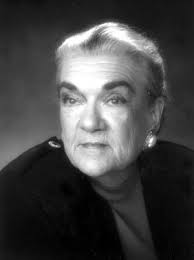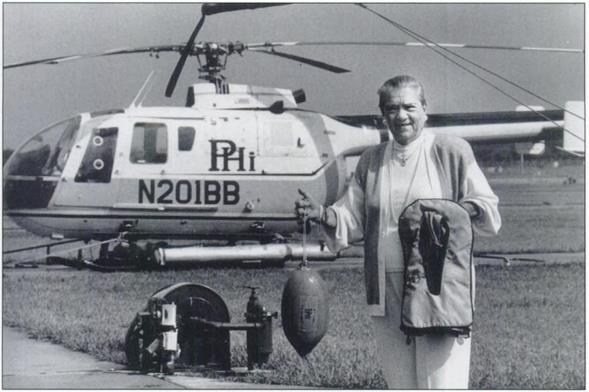MS. margaret mcmillan
2007 Recipient
International Achievement Award
Whether offshore or in the classroom, McMillan is at home wherever there is water. She started swimming competitively at the tender age of 8, and by 11, she had already secured her junior lifesaving badge from the American Red Cross. That feat launched a lifetime of aquatic achievement. In 1937, as a member of the Lutcher High School girls' swim team, McMillan held 11 Southern AAU records for the 100-meter breaststroke. She has been challenging records ever since.
 At age 15, McMillan attended Southwestern Louisiana Institute, now the University of Louisiana, and later earned a degree in 1940 in physical education. McMillan also earned master's degrees from the University of Texas in psychology, and health and physical education. She joined the American Red Cross when World War II erupted, and then returned to SLI as a professor and assistant dean of women, and began developing ideas for marine survival. McMillan is also credited with being a founding member of the "Red Jackets," a women's organization developed to support the school's athletic programs.
At age 15, McMillan attended Southwestern Louisiana Institute, now the University of Louisiana, and later earned a degree in 1940 in physical education. McMillan also earned master's degrees from the University of Texas in psychology, and health and physical education. She joined the American Red Cross when World War II erupted, and then returned to SLI as a professor and assistant dean of women, and began developing ideas for marine survival. McMillan is also credited with being a founding member of the "Red Jackets," a women's organization developed to support the school's athletic programs.In the early 1970's, McMillan was a hugely known local swimming teacher and award-winning university physical education instructor, when she was asked by a supervisor at Phillips Petroleum to develop a water safety program for Phillips employees. Little did McMillan know at the time that the invitation would lead to a seat of honor as a technology pioneer in the Offshore Energy Center Hall of Fame some 30 years later in November of 2004.Or that she would be among the three Laureates -- along with clothing and oil and gas entrepreneurs Herbert Abdalla and Paul Hilliard -- in The Times' Acadiana Business Hall of Fame.
McMillan's legacy as an innovative technology pioneer is directly responsible for having created an international industry dedicated to marine safety and survival training for businesses such as cruise ships and offshore oil, as well as training for the U.S. Coast Guard and international safety at sea regulations.
It wasn't long after McMillan created and presented her water safety course to Phillips employees in the early '70s that she realized one critical issue was not being addressed: The Coast Guard wasn't requiring the oil and gas industry to train employees in the use of emergency survival equipment. McMillan realized she would have to find a way to bring government and business together to change the status quo in order to save lives. And over a 20-year period of time she eventually succeeded on both a national and international scale.
"Back in the old days of the oil field people were taught to run and jump off of the oil rig platforms," says McMillan. “At that time, the oil companies were buying all kinds of life-saving equipment which the U.S. Coast Guard required. Millions of dollars were being spent on life saving equipment, but no one was being trained how to use it, because it wasn't required. So these thoughts were in mind when I started bombarding the Coast Guard asking them why they weren't doing something to require that these people be trained in how to use lifesaving equipment. If they've gotta have it, why don't they know how to use it?"
In 1975, McMillan was appointed to a United Nations subcommittee, the Inter-Governmental Maritime Consultative Organization (IMCO), which met in London, England to write the Lifesaving Systems chapter of the Safety of Life at Sea Treaty (SOLAS).Her efforts to help save lives at sea on an international scale began in London.
When McMillan retired from the University of Louisiana at Lafayette in 1977 after 36 years of teaching aquatics and physical education, the event was hailed by the city of Lafayette as "Margaret McMillan Day. “This civic honor was the result of McMillan's community service and volunteerism that produced a list of accolades and accomplishments far too numerous to mention.
A short time after "retiring" McMillan threw her energy full-time into the survival training consulting company she created, McMillan Offshore Survival Technology (MOST), and continued her efforts to train government and private industry marine personnel worldwide in the use of safety at sea technology.
The International Association for Safety and Survival Training (IASST) was founded in 1980 by McMillan and a group of major safety training providers whose aim was to enhance the quality of emergency response training by encouraging an interchange of knowledge and experience between training providers on a global basis.
McMillan was also a founding member of the United States Marine Safety Association (USMSA), a training and consultation organization for the development of programs dealing with safety of individuals who work, travel or play over water. Summing up her years of teaching and consulting, McMillan says the most rewarding aspect of her career has been helping people survive.
"I was able to move (the Coast Guard program) from a jumping in the water program into a program using everything you possibly could to stay out of the water," she says. “The last place you want to find yourself is in the water. We’ve saved people who were trapped in boats, helicopters, and derricks that have fallen over. It’s so rewarding at my age in life to meet people from all around the world whose lives have been touched by this program."
Margaret McMillan's induction into the Offshore Energy Center Hall of Fame in Houston as a "technology pioneer" marked the first time a woman has been accorded the organization's top honor. Cited her contributions to the offshore industry in "Offshore Safety and Survival Training," the Lafayette native is in renowned company. Previous honorees include oil industry legends such as firefighter Paul N. "Red" Adair and Billy Pugh, inventor of the helicopter rescue safety net.
Other awards include the U.S. Coast Guard’s Distinguished Service Award; the Distinguished Leadership and Service Award, the Gulf Coast Safety and Training Group’s highest honor; and the U.S. Marine Safety Association’s first Safety Award. McMillan has served as a consultant to all branches of the U.S. armed forces, the British Royal Navy and the Russian government. Ms. McMillan passed away September 1, 2016.